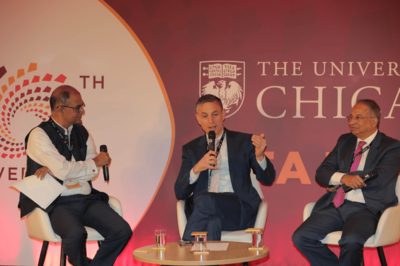
NEW DELHI: The University of Chicago recently marked the 10th anniversary of its Center in Delhi, a milestone celebrating a decade of impactful collaborations across a wide spectrum of disciplines, including liberal arts, medicine, and science. The anniversary highlighted the Center’s role as a hub for research, education, and partnerships that address global challenges.
During its 10th anniversary celebrations, the Center in Delhi hosted a series of events culminating in a year-long focus on “Ideas to Impact.” This initiative aims to further UChicago’s commitment to leveraging its resources to tackle pressing global issues. A key highlight of the celebration was the India launch of the University’s Institute for Climate and Sustainable Growth, which balances the urgency of climate action with the need for sustainable economic progress.
Speaking about this milestone, Supratik Guha, Faculty Director of the UChicago Center in Delhi and a professor at the Pritzker School of Molecular Engineering, reflected, “As we celebrate the 10th anniversary of the University of Chicago Center in Delhi, we reflect on a decade of impactful collaborations that have advanced critical areas such as the liberal arts, social policy, economics, medicine, and, more recently, science and technology. This milestone is not merely a celebration of past achievements but a springboard for the future.”
Established in 2014, the UChicago Center in Delhi serves as a home for collaboration between the University’s scholars and their Indian counterparts. It fosters research and teaching under three broad umbrellas: business, economics, law, and policy; science, energy, medicine, and public health; and culture, society, religion, and the arts. Leni Chaudhuri, Executive Director of the Center, remarked, “Since its inception, the UChicago Center in Delhi has been a catalyst for innovation and change. We’ve undertaken groundbreaking research, nurtured talented students, and built strong partnerships with leading institutions.”
The Institute for Climate and Sustainable Growth, launched earlier this year on October 30 in Chicago and inaugurated in India during the anniversary events, exemplifies UChicago’s commitment to global engagement. The Institute focuses on cutting-edge research in climate economics, sustainable energy technologies, and climate systems engineering. By partnering with Indian researchers, policymakers, and industries, the Institute aims to deliver actionable insights and innovative solutions.
Guha noted the Institute’s potential to influence data-driven policymaking in India. While he emphasized that AI’s role in sustainability remains nascent, he remarked on its potential: “AI has to prove itself in sustainability. This is what we’ll find out in the next ten years. It’s not a done deal.”
Over the past decade, the University of Chicago has undertaken over two dozen projects in India, working with government and industry partners across eleven states, according to an official statement. From improving electricity markets and developing real-time water pollution sensors to helping farmers with advanced weather forecasting and aiding in the creation of emissions markets, UChicago has made a significant policy and technological impact. Much of this work has been led by EPIC India, which is set to play a crucial role in the new Institute.
Reflecting on these efforts, Guha shared an anecdote highlighting the cultural and practical differences in problem-solving between Indian and U.S. students. He recounted how bright Indian researchers spent considerable time improvising field equipment with makeshift solutions rather than designing durable tools. “This sort of mentality where the work relies on – let’s just tie something together and get it going, is helpful in the short term but not sustainable in the long term,” he explained. He emphasised the importance of moving beyond the ‘Jugaad’ mindset to foster innovation and long-term efficiency.
The sustainability sector in India is poised for growth, with increasing investments from both government and industry. Guha sees this as an opportunity for the rise of “green jobs” in areas like clean energy and emissions management. He also highlighted India’s growing research investments, noting a significant increase in funding compared to two decades ago. However, he acknowledged a gap in research intensity when compared to countries like the U.S. and China, while expressing optimism about India’s trajectory.